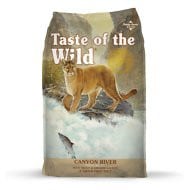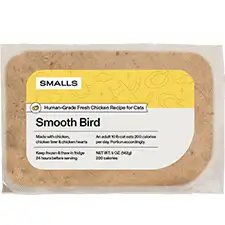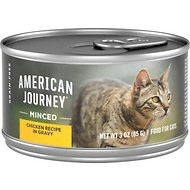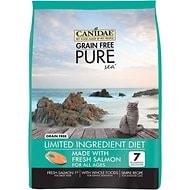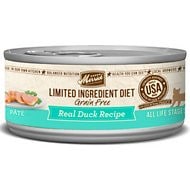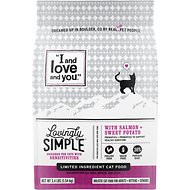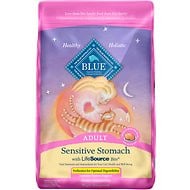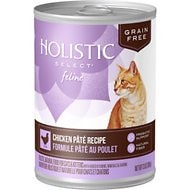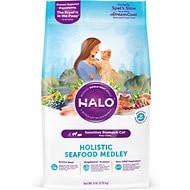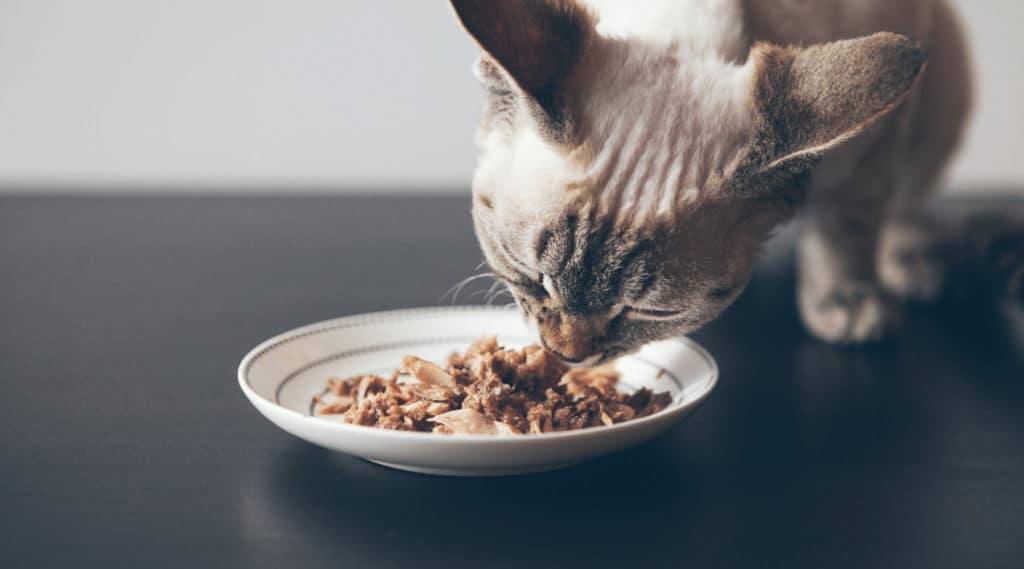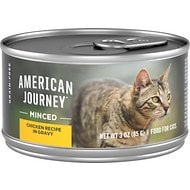Contents
- What Is The Best Cat Food For Irritable Bowel Syndrome?
- What is Irritable Bowel Syndrome in Cats?
- Treatment and Diet for Inflammatory Bowel Disease and IBS
- What to Look for in a Hypoallergenic Cat Food for Irritable Bowel Syndrome
- How Do We Make Our Recommendations?
- The 9 Best Cat Foods for Irritable Bowel Syndrome
- 5 More Top-Rated Cat Foods for Irritable Bowel Syndrome
- Merrick Limited Ingredient Diet Grain-Free Real Duck Pate Canned Food
- I and Love and You Lovingly Simple LID Salmon & Sweet Potato Dry Food
- Blue Buffalo Sensitive Stomach Chicken Recipe Adult Dry Cat Food
- Holistic Select Chicken Pate Recipe Grain-Free Canned Cat & Kitten Food
- Halo Holistic Seafood Medley Sensitive Stomach Dry Cat Food
- Frequently Asked Questions
Cats are known for being aloof, so you may not think that much gets under your cat’s skin. The truth is, however, that cats are just as prone to stress as people, though they may not show symptoms in the same way. For many cats, stress produces digestive symptoms like diarrhea, gas, and vomiting.
Occasional diarrhea is fairly common in cats, but when digestive issues keep happening for days or weeks at a time, you are right to become concerned. Problems with your cat’s digestion are often a sign that something else is going on and they also mean that your cat might not be absorbing nutrients from his food properly. In either case, it is well worth a visit to your veterinarian to determine whether your cat is suffering from some kind of digestive issue like IBS or IBD.
| Our 2023 Picks: Best Cat Foods for Irritable Bowel Syndrome | ||
|---|---|---|
| Smalls Fresh Cat Food Delivery | Our Top Pick
| VIEW LATEST PRICE → |
| Taste of the Wild Canyon River Grain-Free |
| VIEW LATEST PRICE → |
| American Journey Minced Chicken Recipe In Gravy |
| VIEW LATEST PRICE → |
| CANIDAE Grain-Free Limited Ingredient Diet PURE Sea |
| VIEW LATEST PRICE → |
| Merrick Limited Ingredient Diet Grain-Free |
| VIEW LATEST PRICE → |
| I and Love and You Lovingly Simple LID |
| VIEW LATEST PRICE → |
| Blue Buffalo Sensitive Stomach Chicken Recipe |
| VIEW LATEST PRICE → |
| Holistic Select Chicken Pate Recipe Grain-Free |
| VIEW LATEST PRICE → |
| Halo Holistic Seafood Medley Sensitive Stomach |
| VIEW LATEST PRICE → |
In this article, we’ll explore the subject of digestive issues in cats, focusing specifically on irritable bowel syndrome (IBS) and inflammatory bowel disease (IBD). We’ll talk about the differences between these two conditions as well as the symptoms, causes, and treatments for both. You’ll also receive dietary recommendations for treating these conditions with insight into our top picks.
What Is The Best Cat Food For Irritable Bowel Syndrome?
- Smalls Fresh Bird Fresh Cat Food Delivery
- Taste of the Wild Canyon River Grain-Free Dry Food
- American Journey Minced Chicken Recipe in Gravy
- CANIDAE Grain-Free Limited Ingredient Diet PURE Sea
- Merrick Limited Ingredient Diet Grain-Free Real Duck
- I and Love and You Lovingly Simple LID
- Blue Buffalo Sensitive Stomach Chicken Recipe Adult Dry Cat Food
- Holistic Select Chicken Pate Recipe Grain-Free Canned Cat & Kitten Food
- Halo Holistic Seafood Medley Sensitive Stomach Dry Cat Food
What is Irritable Bowel Syndrome in Cats?
Occasional digestive upset is normal for cats, so you may not need to worry if your cat gets a mild case of diarrhea or gas. Chronic digestive symptoms, however, may not be so harmless. There are two primary digestive diseases that can lead to digestive symptoms, and both of them can be very unpleasant and may lead to serious problems if left untreated. We’re talking about irritable bowel syndrome (IBS) and inflammatory bowel disease (IBD).
Though many people think these two conditions are the same, they are very different despite having similar symptoms. IBS is a psychosomatic disease which means that mental problems (namely stress) trigger increased sensitivity in the lower intestinal tract which leads to symptoms. IBD in cats is a physical disease characterized by inflammation of the intestinal lining. Though IBS is very manageable with stress management and dietary changes, IBD in cats can be more serious.
Here are some of the most common symptoms of irritable bowel syndrome:
- Chronic diarrhea
- Soft stools that contain mucus
- More frequent bowel movements
- Passing small amounts of stool
- Straining to pass stool
- Sudden urge to defecate
- Bloating or cramping
- Abdominal pain
- Nausea or vomiting
- Gas or flatulence
As you can imagine, these symptoms overlap with those of numerous other digestive disorders including inflammatory bowel disease, food allergies or intolerance, bacterial infections, and intestinal parasites. Your veterinarian will need to perform certain tests to determine the underlying cause of your cat’s symptoms at which point he will then be able to recommend a course of treatment.
Now that you understand the basics about irritable bowel syndrome, you may be wondering which is the best treatment for your cat. In the next section, we’ll talk about treatment options and explore how changing your cat’s diet might help.
Treatment and Diet for Inflammatory Bowel Disease and IBS
Inflammatory bowel disease can be triggered by a number of things but the syndrome itself is caused by a specific reaction to the chronic irritation in the stomach or intestines. Inflammation is a natural response to injury or the invasion of a foreign substance, but with IBD the inflammation invades the stomach or intestinal wall, causing the lining of the GI tract to thicken. This makes it harder for your cat to absorb nutrients and to move food through the digestive tract. The risk for IBD increases as your cat gets older, most commonly affecting cats 5 to 12 years of age.
Treatment of IBD depends on the underlying cause. In cases of bacterial infection, antibiotic treatment may be required. Intestinal parasites can be treated with broad spectrum deworming treatments and more severe cases may respond to corticosteroids. For both IBD and IBS, dietary modifications can help mitigate symptoms and help the digestive system heal.
What to Look for in a Hypoallergenic Cat Food for Irritable Bowel Syndrome
The term hypoallergenic applies to something that doesn’t trigger an allergy. Because cats can be allergic to a variety of substances, you can easily understand how one cat food might be hypoallergenic for one cat but not for another – it all depends on the individual cat’s allergies. When it comes to choosing hypoallergenic cat foods, your task is made easier if you have already identified the ingredient(s) to which your cat is allergic. If you haven’t, stick with a limited ingredient recipe made with a single source of novel protein to reduce the risk for triggering an allergy.
Here are some of the other things we look for in the best food for cats with IBS and IBD:
- Novel source of animal protein. Cats are obligate carnivores, so they have a biological need for a high-protein diet. In addition to the protein content of your cat’s diet, what also matters is where that protein comes from. Animal sources are more digestible, and you should pick a novel source of protein (one your cat hasn’t had before) if he has IBS or IBD symptoms.
- Limited number of ingredients. Both IBD and IBS symptoms can be triggered or worsened by food allergies or sensitivities, so reduce the risk for triggering both by reducing the number of ingredients in your cat’s food.
- Moderate fiber content and probiotics. Fiber is important to help food move through your cat’s digestive tract, but you want to avoid adding too much fiber to your cat’s diet unless he suffers from constipation. A combination of moderate fiber content and probiotic supplements is good for both IBS and IBD symptoms.
- High-quality, natural ingredients. Whole-food ingredients are much easier for your cat to digest than fillers and by-products, so look for a recipe that is as close to natural as possible. A real source of animal protein should be first and, ideally, animal-based fats. Digestible carbohydrate sources include things like whole grains and vegetables.
- No artificial additives or by-products. Not only do artificial additives and by-products add little in the way of nutritional value to your cat’s food, but they also come with a greater risk for triggering side effects. Simply put, by-products and artificial colors, flavors, and preservatives have no place in a high-quality diet for cats.
Every cat is different and each case of IBS and IBD is unique. You’ll need to take your cat to the veterinarian to diagnose the underlying cause of his digestive issues, but then you’ll have more information to use in choosing a new cat food. If you’re still not sure what to get, consider some of our top picks in the best food for cats with IBD and IBS. Before you do, however, see how we make our recommendations.
How Do We Make Our Recommendations?
Balanced nutrition is important for all cats but if your cat is suffering from digestive issues, the quality of that diet becomes even more important. Real, whole-food ingredients are much more digestible for cats which means that your cat will also be able to absorb more of the nutrients. Keep in mind that cats are obligate carnivores which means that animal-based ingredients will always be more digestible and biologically valuable than plant-based ingredients. These are some of the things we take into consideration when making our top cat food recommendations. Remember as well that we wouldn’t recommend anything that we wouldn’t feel good feeding our own cats.
Here are some of the requirements for a cat food to receive our recommendation:
- A source of high-quality animal protein as the first ingredient
- At least 30% crude protein for kittens and at least 26% for adults
- A minimum of 9% crude fat for kittens and adults
- A balance of omega-3 and omega-6 fatty acids, primarily from animal sources
- A rich blend of nutrients from natural sources and supplements, as needed
- Limited carbohydrate content from digestible sources (like whole grains and veggies)
- No low-quality fillers, by-products, or artificial additives (preservatives, dyes, or flavors)
All of our cat food recommendations are made based, first and foremost, on AAFCO food nutrient profiles. These profiles simply outline the minimum nutritional needs of cats in various life stages (kitten or adult). In order to determine whether a cat food meets these requirements, just look for an AAFCO statement of nutritional adequacy on the package. It should look something like this: [X Product] is formulated to meet the nutritional levels established by the AAFCO Cat Food Nutrient Profiles for all life stages. After you have successfully determined that the formula is complete and balanced, you can go on to evaluating its quality.
The 9 Best Cat Foods for Irritable Bowel Syndrome
When it comes to inflammatory bowel disease in cats, natural treatment methods usually involve a change in diet. Your veterinarian will be able to provide specific recommendations for your cat, but you’ve already learned some of the general things to look for in a hypoallergenic cat food for IBS and IBD. If you’re still not sure what you’re looking for, try one of our recommendations.
Here are our top picks for the best food for cats with IBD or IBS:
Smalls Fresh Bird Human Grade Cat Food
Overall Best Cat Food for Irritable Bowel Syndrome: When it comes to feeding a cat with IBD or IBS, you may feel like your options are limited. You may even be feeling like the best option is to provide a raw diet for cats with ibd. Raw food is loaded with nutrition, but it isn’t a practical or affordable option for most cat owners. Fortunately, an alternative exists: Smalls fresh cat food. Smalls produces fresh pet food using high-quality, natural ingredients in recipes that are complete and balanced. Simply provide some basic information about your cat and you’ll receive pre-portioned packages of fresh cat food sent right to your door. Each recipe is prepared in small batches to ensure nutritional quality and, because it is rich in moisture and made from whole foods, it is highly digestible. Plus, each package is customized to your cat’s individual calorie needs, so you never have to measure food again.
Pros: High-quality natural ingredients, rich in protein, very digestible, complete and balanced nutrition, rich in moisture, prepared in small batches, pre-portioned and sent to your door
Cons: Only two recipes to choose from, significantly more expensive than kibble
Taste of the Wild Canyon River Grain-Free Dry Food
Most Popular Cat Food for Irritable Bowel Syndrome: There are dozens of cat food brands out there, each with their own assortment of recipes. This level of variety can make it difficult to choose, especially when you’re worried about triggering your cat’s allergies or sensitivities. If you’re not sure where to turn, consider Taste of the Wild as a well-trusted brand. This Taste of the Wild Canyon River Grain-Free Dry Food is a great choice for cats with IBS and IBD because it contains novel animal proteins like trout, ocean fish, and smoked salmon. These protein-rich ingredients are supplemented by other whole food ingredients to ensure complete and balanced nutrition. This recipe also contains supplemental fiber, digestive enzymes, and probiotics to support your cat’s healthy and regular digestion.
Pros: Rich in novel animal proteins, highly digestible natural ingredients, complete and balanced, fortified with vitamins and chelated minerals, digestive enzymes and probiotics
Cons: Contains some plant proteins (potato and pea protein), main source of fat is plant-based
American Journey Minced Chicken Recipe in Gravy Grain-Free Canned Food
Most Affordable Cat Food for Irritable Bowel Syndrome: You don’t necessarily need to spend a small fortune to feed your cat well. This American Journey Minced Chicken Recipe in Gravy canned food is a great option for cats with digestive issues because it contains real animal protein and a limited list of other ingredients. Fresh chicken is the first ingredient and primary source of protein, supplemented with chicken liver and eggs. With chicken broth and turkey broth as main ingredients, this formula is rich in moisture and natural flavor. The higher moisture content increases digestibility while vitamins and chelated mineral supplements help to ensure nutritional balance. Overall, this is a great recipe for an affordable price.
Pros: Real chicken first ingredient, high in protein and moisture, digestible natural ingredients, fortified with vitamins and chelated minerals, complete and balanced nutrition
Cons: Some cats are sensitive to chicken, main source of fat is plant-based
CANIDAE Grain-Free Limited Ingredient Diet PURE Sea with Salmon Dry Cat Food
Best Cat Food for Irritable Bowel Syndrome and Sensitive Stomach: If your cat has inflammatory bowel disease and has been diagnosed with food sensitivities, you definitely need a limited ingredient diet. The fewer ingredients in the food, the less there is for your cat to react to. This Canidae Grain-Free Limited Ingredient Diet PURE Sea with Salmon is an excellent choice because it contains just 7 main ingredients. The first ingredient is fresh salmon, a novel source of protein for many cats, and it is supplemented with salmon meal and menhaden fish meal to boost the protein levels. This recipe is highly digestible, made with whole-food sources of grain-free carbohydrate like potatoes and peas with canola oil for healthy fats and sweet potatoes for key nutrients. This recipe is fortified with essential vitamins and chelated minerals to ensure optimal nutrient absorption with probiotic supplements to help regulate your cat’s digestion.
Pros: Limited number of ingredients, novel source of animal protein, highly digestible, complete and balanced nutrition, chelated minerals, probiotic supplements
Cons: Not a single-source protein recipe, very expensive compared to average cat food
5 More Top-Rated Cat Foods for Irritable Bowel Syndrome
If your cat suffers from IBS or IBD, you need to find a new cat food that won’t trigger negative reactions. If the recipes above contain ingredients your cat is sensitive to, maybe some of our other picks won’t. here are 5 more options for you to consider:
Merrick Limited Ingredient Diet Grain-Free Real Duck Pate Canned Food
Wet cat food is higher in moisture content than kibble and it also tends to be more protein-rich. Both of these qualities support healthy digestion, especially for cats with IBD and IBS. One of our top choices in the best wet cat food for ibs is this Merrick Limited Ingredient Diet Grain-Free Real Duck Pate Canned Food. This recipe contains a limited number of ingredients with duck as a single source of novel animal protein. The only other main ingredients are water, peas, and alfalfa. This recipe is complete and balanced with the help of vitamins and chelated mineral supplements. If you’re looking for a simple, protein-rich recipe to help ease your cats IBS or IBD symptoms, this is one to consider.
I and Love and You Lovingly Simple LID Salmon & Sweet Potato Dry Food
Cat food sensitivities can be difficult to treat, especially if you’re not sure what your cat is reacting to. This I and Love and You Lovingly Simple LID Salmon & Sweet Potato is a safe choice for many cats because it contains a limited list of ingredients including novel sources of protein and digestible grain-free carbohydrates. To help cats with IBS and IBD, it also contains supplemental fiber with probiotics to boost and help regulate digestion. This recipe contains vitamin and chelated mineral supplements to ensure complete and balanced nutrition as well.
Blue Buffalo Sensitive Stomach Chicken Recipe Adult Dry Cat Food
If your cat has a sensitive stomach but is still able to tolerate chicken, this Blue Buffalo Sensitive Stomach recipe could be a good choice. It features nutritious whole-food ingredients and is fortified with essential vitamins and minerals to ensure complete and balanced nutrition. It is formulated specifically for adult cats with sensitive stomachs and contains a rich blend of omega-3 and omega-6 fatty acids for skin and coat support. It also contains LifeSource Bits, Blue Buffalo’s proprietary blend of antioxidants, vitamins, and minerals to provide immune support and nutritional balance.
Holistic Select Chicken Pate Recipe Grain-Free Canned Cat & Kitten Food
Another one of our top pics for the best wet cat food for ibd is this Holistic Select Chicken Pate Recipe Grain-Free Canned Cat & Kitten Food. This holistic, natural recipe features whole food ingredients like fresh chicken, chicken liver, and turkey. It also contains ground flaxseed, salmon oil, and an assortment of fruit and vegetable powders. These ingredients promote healthy and regular digestion through fiber supplementation, not to mention the fact that they are all-natural and rich sources of key vitamins and minerals. This recipe is complete and balanced for adult cats and kittens as well, so you don’t have to upset your kitten’s stomach by switching him to a new recipe when he becomes an adult.
Halo Holistic Seafood Medley Sensitive Stomach Dry Cat Food
Wholesome, natural ingredients are the key to a healthy diet for cats with IBD and IBS. This Halo Holistic Seafood Medley Sensitive Stomach Dry Cat Food is a great choice because it is holistic and all-natural, formulated to nourish your cat’s body from the inside out. It contains sustainably caught whitefish and salmon as the first two ingredients with a rich blend of non-GMO vegetables and nourishing oils to ensure complete and balanced nutrition. This recipe is specially formulated for digestibility and contains a total of 32% protein with 16% fat and 5% fiber at 414 calories per cup.
Frequently Asked Questions
- What do you feed a cat with IBS? Recurring digestive issues can be frustrating for a cat owner because it can be difficult to determine the underlying cause. Occasional digestive upset may be due to something your cat ate or it could simply be a matter of stress. Other possibilities include parasites, intestinal infections, and food allergies or sensitivities. Making changes to your cat’s diet can help manage IBS symptoms, but what is the best food for cats with IBS? Many veterinarians recommend a diet high in fiber that is supplemented with probiotics to help ease and improve your cat’s digestion. Generally speaking, a diet made with high-quality natural ingredients can also improve your cat’s digestion and may help ease symptoms.
- Can a cat die from IBD? Irritable bowel disease is more serious than irritable bowel syndrome because it is typically caused by some kind of physical issue. IBS, on the other hand, can be triggered by stress and is generally easier to treat. Though IBD in cats can be severe and it is not a curable disease, the prognosis is generally good for controlling the disease. According to one case study, nearly 80% of cats with IBD showed positive responses to treatment involving prednisone and dietary changes.
- Do probiotics help cats with IBD? Inflammatory bowel disease is characterized by inflammation in the digestive tract. The exact cause is unknown, but it is thought to be some combination of dietary factors combined with issues with the immune system, bacterial populations in the intestines, and other environmental factors. Most of the clinical signs of IBD are digestive, including vomiting, diarrhea, bloody stools, and decreased appetite. These symptoms can sometimes be mitigated with probiotics that help restore healthy bacterial populations in the intestines to boost and regulate digestion. Probiotics alone may not be enough to treat IBD, but they can help.
- What is the difference between IBS and IBD in cats? Many people think that the acronyms IBS and IBD are interchangeable when, in fact, the two refer to entirely separate diseases. Irritable bowel syndrome or IBS tends to be fairly mild, involving digestive symptoms like diarrhea, bloating, cramping, gas, and vomiting. Irritable bowel disease or IBD is more severe, involving inflammation of the digestive tract which can have an autoimmune component. To determine which condition your cat has, you’ll need to talk to your veterinarian. He’ll use your cat’s history of symptoms and may conduct additional tests to make the diagnosis.
- How long can a cat live with chronic diarrhea? Diarrhea is fairly common in cats, especially cats that spend time outdoors and might eat substances other than commercial food. In most cases, diarrhea resolves itself within 24 to 48 hours and isn’t anything to be worried about. If it happens in old cats or very young kittens, however, there is a risk for dehydration. Chronic diarrhea is defined as diarrhea symptoms that recur for at least three weeks. In these cases, dehydration is a greater risk. If your cat has blood or mucus in his stool, you should contact your veterinarian immediately.
Many pet owners make the mistake of taking their cat’s healthy digestion for granted. What makes cats great is the fact that they do their business in private, leaving you with the simple task of scooping the litter box a few times a week. Out of sight, out of mind. Right? Unfortunately, the same thing that makes cats superior to dogs (in the minds of some pet owners) can also be their downfall. Because you’re not monitoring your cat’s digestive function as closely as you might with a dog, you can miss the signs of developing digestive problems like IBS and IBD.
Untreated digestive issues can lead to serious problems like malabsorption and malnutrition. At the first sign of chronic diarrhea or other digestive issues, take your cat to the vet to determine the underlying cause and the optimal form of treatment. From there, you may want to look into other options for your cat’s food. If it comes to that, take what you’ve learned here to shop smart for your cat or try out one of our top picks reviewed above. Best of luck!

